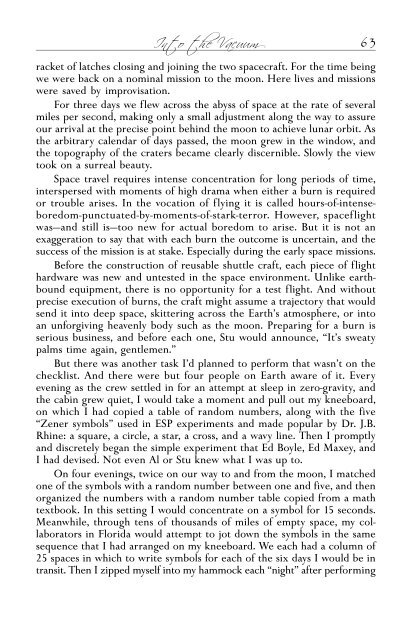edgar-mitchell
edgar-mitchell
edgar-mitchell
Create successful ePaper yourself
Turn your PDF publications into a flip-book with our unique Google optimized e-Paper software.
32<br />
The Way of the Explorer<br />
not only reinterprets much of 20th-century science, but also shows some<br />
of its basic flaws.<br />
In the towns we visited through these nomadic years, Louise and I<br />
sought out local parishes where we found pastors and congregations with<br />
sensibilities more or less compatible with our own—that is to say, concerned<br />
with the deeper questions of purpose, destiny, and the human<br />
condition. In West Newton, we found this companionship in the company<br />
of Jim Remington, a young married man my age who pastored the local<br />
Baptist church. On warm summer evenings Jim and I would sit out on the<br />
patio and become lost in discussions that meandered from free will and<br />
determinism to the nature of God, to the structure of the universe itself,<br />
and how this new science I was becoming acquainted with illuminated our<br />
understanding. Jim was an uncommon man of his vocation, in that he was<br />
vitally interested in discussion that challenged Christian dogma. He was<br />
never dogmatic in his own beliefs, having an intellectual bent that I liked<br />
to think was similar to my own. I was coming to realize as an adult that it<br />
was possible to place myself within the same sphere of influence as that of<br />
a Baptist minister and still maintain an independence of mind. And perhaps<br />
as a result I came to realize how my early fundamentalist upbringing<br />
had shaped my thought, though I was fast on my way to becoming a dyedin-the-wool<br />
agnostic. My mind, I knew, was somehow capable of containing<br />
this paradox. Yet for many years I would harbor some hidden fear of<br />
God, some fear brought to bear by the residue of that upbringing, a soft<br />
whisper warning me of the eternal penalty for blasphemy or casual irreverence.<br />
There was the sense that the potential for damnation lay in the<br />
spoken word, and even perhaps in thought.<br />
But this was my own shadowed background, one I ignored as Jim and<br />
I sat in the cool evening air making rather erudite investigations into what<br />
our place was in this wide world. The climate of inquiry, I silently told<br />
myself, was sufficiently reverent for any kind-spirited Creator.<br />
I haven’t always had an interest in the details of enigmatic scientific<br />
problems. When I came to MIT I was a passable mathematician. The abstract<br />
topography of science was a landscape I was comfortable moving<br />
about, yet there were deep domains with which l struggled. But here I was<br />
at one of the most prestigious institutions of higher learning on the planet,<br />
working on a project mandated by a president slain while I was in residence<br />
there, all of which was in the interest of landing a man on the moon.<br />
In spite of this, I had no interest in exploring the finer, capillary regions of<br />
science, but preferred rather the broader issues of morphology and cosmology.<br />
My interests lay in how things fit together. I saw mathematics<br />
simply as a tool, a language, but one of various methods for obtaining a


